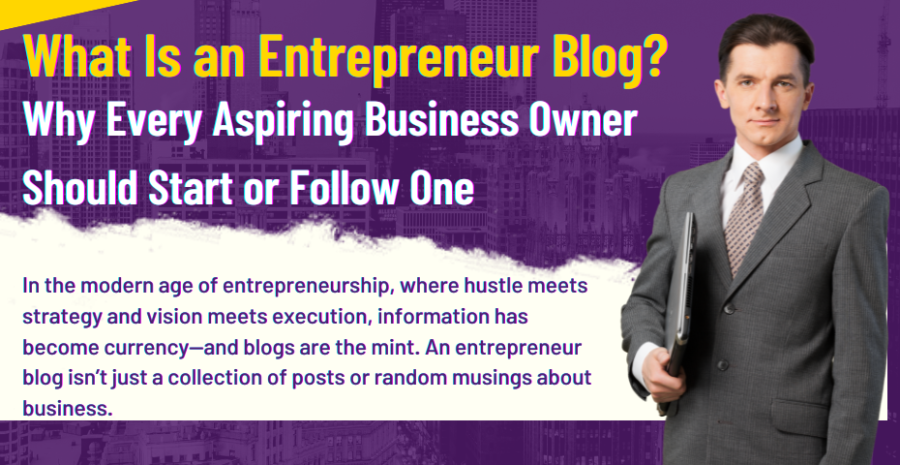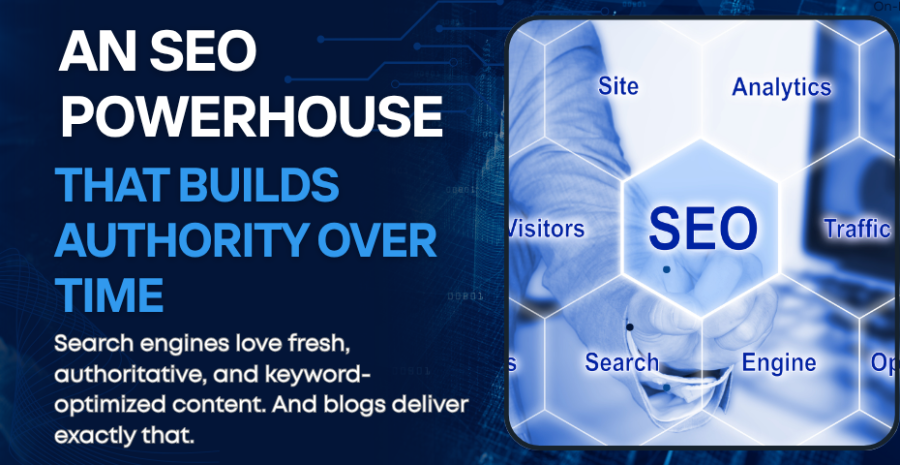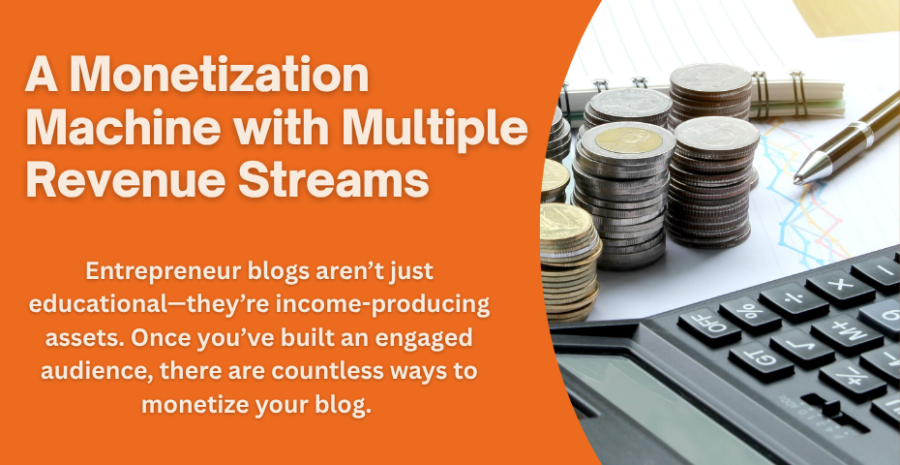
What Is an Entrepreneur Blog? Why Every Aspiring Business Owner Should Start or Follow One.

In the modern age of entrepreneurship, where hustle meets strategy and vision meets execution, information has become currency—and blogs are the mint. An entrepreneur blog isn’t just a collection of posts or random musings about business.
It’s a vital digital hub, a compass that helps aspiring and experienced entrepreneurs alike navigate the unpredictable waters of starting and growing a venture. These blogs serve as roadmaps for those eager to move beyond inspiration into actionable execution.
They often contain insights drawn from real-world experience, rich case studies, curated resources, failures turned into frameworks, and the occasional breakthrough idea that changes everything.
Whether you’re looking to learn how to draft a pitch deck, bootstrap your startup, launch your next product, or simply stay ahead of the latest trends in marketing and tech—entrepreneur blogs have something for everyone.
They are also the backbone of personal branding for founders who wish to establish authority in their niche. Moreover, in an age where trust drives transactions, a well-crafted entrepreneur blog builds credibility, attracts investors, and strengthens connections with customers.
It's not just a content marketing tool—it’s a storytelling vehicle, a teaching platform, a journal of lessons learned, and a digital legacy.
So what exactly makes an entrepreneur blog tick? Why do they matter? And how can you use or create one to grow your influence, insight, and income?
Let’s explore 8 reasons why these blogs are indispensable to anyone serious about business success in the digital age.

Entrepreneur blogs offer something business textbooks can’t: lived experience. They are often written by people in the trenches—building companies, launching products, scaling operations, and managing teams.
These firsthand stories provide nuanced, relatable, and sometimes raw accounts of what entrepreneurship really looks like.
From facing cash flow crises to negotiating investor deals, an entrepreneur blog brings readers into the room where decisions happen. This transparency helps demystify business success and removes the glossy filters from entrepreneurial glamor.
New entrepreneurs, in particular, benefit from reading how others made decisions, adapted to challenges, and overcame self-doubt. By documenting what worked and what didn’t, bloggers create a library of real lessons, not just theory.
These stories also foster connection. Readers don’t just follow a blog—they follow a journey. And in doing so, they gain the confidence to start or persist in their own.
Whether it’s launching a side hustle, quitting a 9-to-5, or scaling a startup, entrepreneur blogs provide a narrative blueprint that says, “You can do this too.”
This shared journey of building creates a tight-knit ecosystem of like-minded individuals who support each other’s growth.
Ultimately, experience is the best teacher—and blogs bring that classroom to your screen every day.
.png)
For anyone stepping into the entrepreneurial world, blogs are often the first—and most accessible—learning platform. Unlike expensive MBA programs or online courses with paywalls, entrepreneur blogs are typically free and regularly updated.
They offer a treasure trove of how-to guides, productivity hacks, strategic insights, and trend analyses. Whether you need help choosing the right business model or understanding customer personas, there’s likely a blog post already written about it.
Many successful entrepreneurs started by simply reading blogs, taking notes, and applying what they learned. The best entrepreneur blogs break down complex concepts into digestible, actionable content.
They might walk you through writing a one-page business plan or offer templates for social media marketing.
This practical, hands-on guidance is gold for people building from the ground up. Furthermore, blogs often reflect the most current tools and technologies—things that traditional education may lag behind on.
You’ll find posts about using AI for productivity, leveraging TikTok for growth, or automating lead generation with new SaaS tools.
This real-time edge helps entrepreneurs stay competitive. And because most blogs include comments or communities, learning doesn’t happen in isolation. You can ask questions, receive feedback, and join discussions.
In this sense, blogs become digital classrooms for business development—interactive, evolving, and always available.

An entrepreneur blog doesn’t just serve your audience—it serves your reputation. In today’s attention economy, where people buy into people before they buy their products, building a personal brand is non-negotiable.
A blog is the perfect platform to do that. By regularly publishing valuable content, you position yourself as a knowledgeable voice in your industry.
Whether you focus on startup culture, e-commerce, blockchain, or social entrepreneurship, consistent blogging allows you to develop a unique voice and establish authority.
Over time, people begin to associate your name with expertise, reliability, and insight. This can lead to speaking engagements, media interviews, podcast invitations, and even consulting gigs.
It also makes it easier to attract investors, partners, and talent who resonate with your vision and values.
Think of your blog as your digital handshake—the first interaction many people have with you and your brand. Make it count.
Share case studies, write about lessons from your failures, analyze trends in your niche, and give your take on industry shifts.
This not only boosts SEO but deepens trust with your audience. Personal branding is no longer optional in entrepreneurship. It’s the foundation upon which opportunities are built.
And blogs are the cornerstone of that foundation.

In a world dominated by inbound marketing, entrepreneur blogs have become powerful lead-generation tools. Every blog post is an opportunity to attract new visitors via search engines, social shares, or referrals.
With the right SEO strategies—optimized keywords, strong headlines, and quality backlinks—blogs can drive organic traffic consistently.
But they don’t stop at attraction. A well-structured blog nurtures your readers through the customer journey.
For instance, a top-of-funnel blog might explain the basics of starting a business, while a bottom-of-funnel post might include a free consultation offer or product link.
Smart entrepreneurs integrate CTAs (calls-to-action), email opt-ins, and lead magnets into their blogs to grow their mailing list. Over time, this creates a self-sustaining content engine that works 24/7.
It pulls in readers, builds trust, educates them on your solutions, and eventually converts them into customers.
When done right, your blog becomes your top salesperson—never needing rest, always delivering value, and building relationships at scale.
And with repurposing strategies (like turning blogs into videos, podcasts, or infographics), your content stretches even further, maximizing ROI.
In essence, your blog is your digital storefront and customer onboarding portal, all rolled into one.

Entrepreneurship can often feel lonely. But blogs turn solitude into solidarity. They become digital gathering spaces where like-minded thinkers, builders, and doers connect.
Comment sections, newsletters, and embedded communities (like Discord or Facebook groups linked to a blog) offer readers a place to engage, ask questions, and share experiences.
At the crossroads of innovation, where the worlds of inbound marketing and blockchain technology converge, lies Markethive, a platform that is rewriting the rules of engagement. Inbound marketing, the heartbeat of Markethive's strategy, is all about creating meaningful interactions.
It's a departure from the one-way communication of old marketing methods. Instead, it's a conversation, a dialogue, and a relationship-building endeavor. Markethive recognizes the power of this approach and has harnessed it to its fullest potential. Through the platform's array of tools and features, content creation becomes an art, and engagement transforms into a science.
These communities are often more loyal and engaged than social media followers because they’ve invested time in consuming deeper, more meaningful content.
For blog creators, this means powerful feedback loops. Readers tell you what topics they care about, what questions remain unanswered, and what problems they’re facing. You can use this data to tailor your products, services, or content.
The result? A thriving ecosystem where readers feel heard and entrepreneurs feel supported. Over time, these connections evolve into collaborations, partnerships, and even lifelong friendships. And because blog audiences are self-selected and topic-specific, the community is often more relevant and focused than broad social media audiences.
Whether you're building a SaaS product or launching a coaching service, your blog can serve as the central hub that nurtures your tribe—and keeps them coming back for more.

The process of entrepreneurship is often chaotic and nonlinear. That’s why documenting the journey through blogging serves a powerful dual purpose: reflection and inspiration.
For the writer, it becomes a space to crystallize thoughts, review decisions, and extract lessons from experiences. This self-reflection improves clarity and strategic thinking.
It also creates a public record of growth—something you can look back on years later to see how far you’ve come. For the reader, this documentation is inspiring. It shows that success doesn’t happen overnight.
That the road is filled with trials, pivots, and persistent effort. By openly sharing both wins and setbacks, bloggers paint a realistic picture of entrepreneurship, removing the illusion of perfection. It also humanizes success.
When people see your beginnings, mistakes, and mid-course corrections, they connect more deeply with your story. Over time, this authenticity builds trust and loyalty. A blog isn’t just content. It’s a journal, a legacy, a roadmap.
Whether you’re at day one or year ten of your business, documenting your journey is a gift to yourself and your audience.

Search engines love fresh, authoritative, and keyword-optimized content. And blogs deliver exactly that. With every new post, your site gains more entry points for people to discover you. Over time, this snowballs into domain authority—making your site more visible in Google results.
Unlike paid ads, which stop the moment you stop spending, blog content continues to generate traffic for months or even years.
That’s the beauty of compounding SEO. Smart entrepreneurs research their audience’s search intent and craft blog posts that answer specific, high-value questions. Tools like Google Keyword Planner, Ahrefs, or Ubersuggest help find topics with high demand and low competition.
Adding internal links, backlinks from partners, and media like images or videos boosts your ranking even further. As your blog gains traction, it starts to outrank competitors and capture market share—organically. SEO blogging is a long game, but one with tremendous payoffs.
It establishes you as a trusted authority, brings in warm leads, and reduces your dependency on paid marketing channels.
The best part? Once a blog ranks, it brings you leads on autopilot.

Entrepreneur blogs aren’t just educational—they’re income-producing assets. Once you’ve built an engaged audience, there are countless ways to monetize your blog. You can offer digital products like eBooks, templates, or courses.
You can sell coaching, consulting, or agency services. You can include affiliate links to tools you recommend and earn commissions. You can also run sponsorships, display ads, or even host paid newsletters. For product-based entrepreneurs, blogs boost sales by increasing trust and educating potential buyers.
For service-based businesses, they act as a portfolio and proof of expertise. The key to monetization is value. When your blog consistently delivers high-quality, relevant content, people naturally want to support you—either by buying, subscribing, or sharing.
Over time, your blog becomes more than a marketing tool. It becomes a digital asset that appreciates with age. A well-written blog post might earn you income years after it’s published. Few marketing strategies can match that kind of return.
In a world saturated with noise, an entrepreneur blog cuts through with clarity, authenticity, and value. It is the modern-day entrepreneur’s Swiss Army knife—equally capable of teaching, marketing, networking, documenting, and monetizing.
Whether you’re a solopreneur building from your kitchen table or a CEO scaling a seven-figure startup, your blog gives voice to your journey, strategy to your vision, and reach to your mission.
But it’s not just for you. It’s for the dreamer trying to figure out their next step, the freelancer planning their first product launch, or the investor searching for a founder with substance. An entrepreneur blog educates, inspires, and transforms—not only the audience, but the writer too.
It helps clarify ideas, document growth, and attract aligned opportunities. When done right, your blog is your most valuable digital asset—earning you traffic, trust, and income long after the post is published.
So whether you're looking to learn from others or build your own blogging empire, don’t underestimate the power of this simple yet profound platform.
Entrepreneur blogs are no longer optional. They are essential tools in the digital age of business.
Ready to build yours?
Your time to thrive is now. One step at a time.
.jpg)
About: Andries vanTonder (66)
Over 46 years selfemployed
He is a Serial Entrepreneur, an Enthusiastic supporter of Blockchain Technology and a Cryptocurrency Investor
Find me: Markethive Profile Page | My Twitter Account | My Instagram Acount | and my Facebook Profile.
